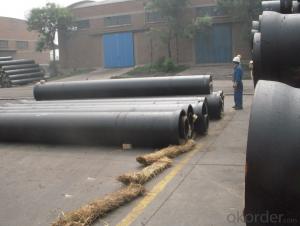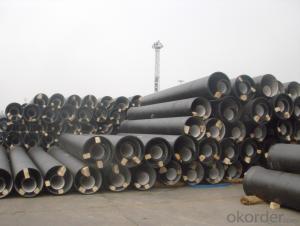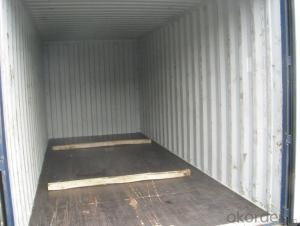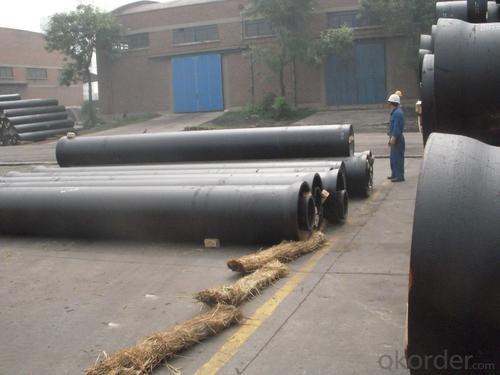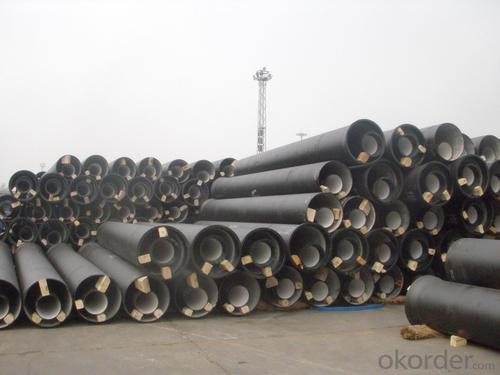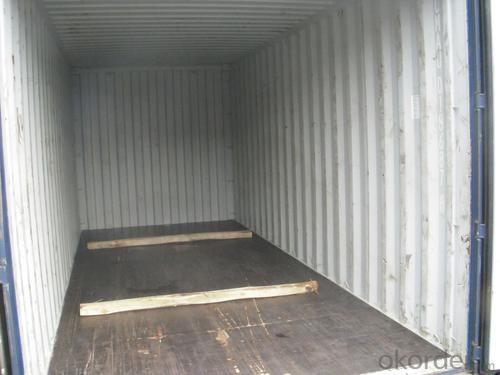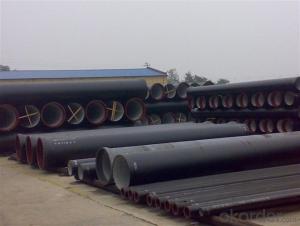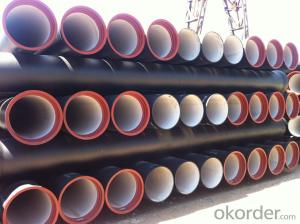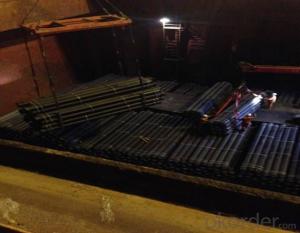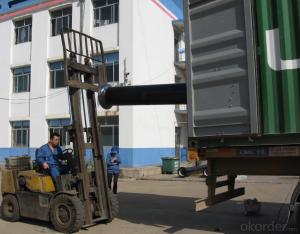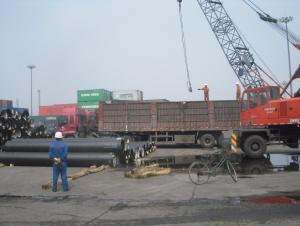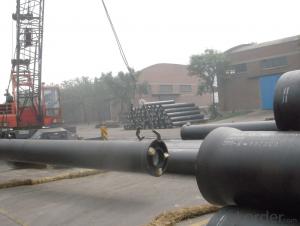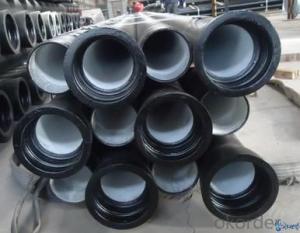DUCTILE IRON PIPES K8 DN450
- Loading Port:
- China Main Port
- Payment Terms:
- TT OR LC
- Min Order Qty:
- -
- Supply Capability:
- -
OKorder Service Pledge
OKorder Financial Service
You Might Also Like
Ductile Iron Cast Pipe is without any defects compare with tradition casting tech, which has many advantages particularly as follow:
(1) High density. In the "vertical upward casting" process, the melt iron of centre liquid column in center crystallizer is continuously feeding for volume shrinkage caused by condensation tube at outer circumference , which lead to be free of shrinkage porosity.
(2) High purity. When melt iron pouring, the mixed impurities such as gas, dross, sand grain which are lighter than melt iron could be eliminated at furnace mouth, its impossible to enter into the crystallizer through the channel, so the melt iron into the crystallizer is very pure.
(3) Strength with toughness. The cooling speed provided by continuous crystallizer is 30 times than sand casting and 5 times than centrifugal casting, and doesn't produce white iron, the eutectic cell volume of continuous cast iron is one eighth to one tenth compare with traditional cast iron. The density of graphite nodule in ductile iron can reach 300-700 pcs/mm2. Therefore, all reason above improve the strength and toughness of continuous cast iron.
(4) Free machining. The high speed cooling make the hardening phase (such as boride, steadite) not appear like reticular, massive or thick, but diffuse like fish bone and pane in shape, moreover, there are tiny graphite flakes inlaid hardening phase. It's free machining in BrinellHardness the range of 250-300HB. However, the Brinell Hardness of 250 is top limit to common metal materials.
(5) Uniform composition of tube wall. The convection mixing of liquid column caused by marching type drawing in crystallizer make the composition of tube wall well-distributed, and concentration gradient very little.
(6) High productivity. To the wall thickness of tube under 10mm, the speed of continuous casting is 1 meter/min, to the wall thickness of tube under 20mm, the speed of continuous casting is 0.5 meter/min, which is high efficiency that centrifugal or other casting tech couldn't reach.
- Q: How does ductile iron pipe perform in high-temperature environments?
- Ductile iron pipe performs exceptionally well in high-temperature environments due to its unique properties and characteristics. The material is known for its high strength, toughness, and durability, making it suitable for various applications including those involving elevated temperatures. One of the key advantages of ductile iron pipe in high-temperature environments is its ability to withstand thermal expansion and contraction. The material has a low coefficient of thermal expansion, which means it can handle significant temperature fluctuations without experiencing detrimental effects. This property ensures that the pipe remains structurally stable and does not deform or crack when exposed to high temperatures. Additionally, ductile iron pipe has excellent thermal conductivity. This property allows the pipe to efficiently transfer heat, preventing the build-up of excessive heat and reducing the risk of thermal stress. The high thermal conductivity of ductile iron also enables it to dissipate heat quickly, ensuring that the pipe remains within safe operating temperatures. Furthermore, ductile iron pipe has a high melting point, typically around 2200°F (1200°C). This characteristic ensures that the pipe retains its structural integrity even in extremely high-temperature environments. It can effectively handle hot fluids, steam, and other high-temperature substances without compromising its performance. Another crucial aspect is the corrosion resistance of ductile iron pipe. It is commonly coated with protective linings, such as cement mortar or epoxy, which provide an additional layer of defense against corrosion caused by high temperatures. These linings act as a barrier, preventing the pipe from coming into direct contact with corrosive substances and maintaining its longevity in high-temperature environments. In summary, ductile iron pipe is an excellent choice for high-temperature environments due to its exceptional strength, thermal stability, thermal conductivity, and corrosion resistance. Its ability to withstand thermal expansion, its high melting point, and its efficient heat transfer properties make it a reliable and durable option for various applications in such conditions.
- Q: What is the expected fire resistance of ductile iron pipes?
- The fire resistance of ductile iron pipes can vary based on factors such as pipe wall thickness, installation quality, and surrounding conditions. However, in general, ductile iron pipes exhibit high fire resistance due to their durable and heat-resistant composition. Ductile iron is created by adding a small amount of magnesium to cast iron, which enhances its strength and flexibility. This results in ductile iron pipes being less prone to cracking or breaking under high temperatures compared to materials like PVC or HDPE pipes. Regarding fire resistance, ductile iron pipes can endure high temperatures for a prolonged period without significant structural damage. They have undergone testing and have been proven to maintain their integrity in fire situations for 2-4 hours, depending on the specific pipe design and installation. It is important to note that while ductile iron pipes possess high fire resistance, they are not fireproof. In the event of a fire, it is vital to adhere to proper fire safety procedures and seek advice from professionals to ensure the safety of the system and surrounding infrastructure.
- Q: How are ductile iron pipes protected against abrasion or wear?
- Ductile iron pipes are protected against abrasion or wear through various methods, including external coatings and linings. These protective measures serve to create a barrier between the pipe's surface and any potential abrasive materials or fluids it may come into contact with. Additionally, the use of sacrificial anodes and cathodic protection systems can also help prevent corrosion and extend the lifespan of the pipes.
- Q: Are ductile iron pipes suitable for pressure sewer systems?
- Yes, ductile iron pipes are suitable for pressure sewer systems. Ductile iron pipes have been widely used in various applications, including pressure sewer systems, due to their high strength and durability. These pipes are able to withstand high pressure and provide a reliable and long-lasting solution for transporting sewage under pressure. Ductile iron pipes also have excellent corrosion resistance, which is crucial in sewer systems where they are exposed to various chemicals and contaminants. They are resistant to both internal and external corrosion, ensuring that the pipes remain intact and functional over time. Furthermore, ductile iron pipes have a smooth internal surface, which helps to minimize friction and improve the flow capacity of the sewer system. This ensures that the pipes can handle the required flow rates and prevent any blockages or backups. In addition to their strength and corrosion resistance, ductile iron pipes are also known for their ease of installation. They can be easily cut and joined using a variety of methods, making them a convenient choice for pressure sewer systems. Overall, ductile iron pipes are a suitable and reliable choice for pressure sewer systems due to their high strength, corrosion resistance, smooth internal surface, and ease of installation.
- Q: Can ductile iron pipes be used for road and highway drainage?
- Ductile iron pipes are a viable option for road and highway drainage purposes. With their exceptional strength and durability, these pipes are well-suited for a range of applications, including drainage systems. They possess a high tensile strength and can endure heavy loads and traffic, making them an ideal choice for road and highway drainage, where continuous vehicle movement is anticipated. Moreover, ductile iron pipes are resistant to corrosion and have a long lifespan, minimizing the need for maintenance and replacement, ultimately reducing costs. Additionally, their smooth inner surface enables efficient water flow, preventing waterlogging and ensuring proper drainage. Hence, ductile iron pipes are a dependable and efficient selection for road and highway drainage systems.
- Q: What is the minimum operating temperature for ductile iron pipes?
- The minimum operating temperature for ductile iron pipes is typically -40 degrees Celsius. Ductile iron has excellent strength and ductility even in cold temperatures, making it suitable for a wide range of applications, including water and wastewater systems. However, it is important to note that the specific minimum operating temperature can vary depending on factors such as the specific grade of ductile iron used and the application requirements. It is always recommended to consult the manufacturer's specifications and guidelines to ensure proper usage and performance of ductile iron pipes in cold temperatures.
- Q: How does ductile iron pipe handle thermal expansion and contraction?
- Ductile iron pipe is well-known for its ability to handle thermal expansion and contraction effectively. This is primarily due to its unique material properties and design characteristics. Firstly, ductile iron pipe has a high coefficient of linear expansion, which means it expands and contracts relatively more compared to other materials when subjected to temperature changes. This property allows the pipe to accommodate thermal expansion and contraction without causing excessive stress or deformation. Additionally, ductile iron pipes are designed with flexible joints that can absorb the movement caused by thermal expansion and contraction. These joints, such as push-on or mechanical joints, provide a certain level of flexibility and allow the pipe to expand and contract within a specific range without compromising its structural integrity. Furthermore, the material composition of ductile iron itself contributes to its ability to handle thermal expansion and contraction. Ductile iron is a type of cast iron alloy that contains nodular graphite in its microstructure, providing it with enhanced ductility and tensile strength. This inherent ductility enables the pipe to withstand the stresses induced by thermal expansion and contraction without fracturing or breaking. Overall, ductile iron pipe is designed and manufactured to effectively handle thermal expansion and contraction. Its high coefficient of linear expansion, flexible joints, and ductile material properties all work together to ensure that the pipe can accommodate temperature changes without causing any significant issues or structural failures.
- Q: How do ductile iron pipes handle concentrated loads?
- Ductile iron pipes are designed specifically to effectively handle concentrated loads. Their unique composition and manufacturing process give them excellent strength and durability, making them highly resistant to cracking or breaking under heavy loads. One of the main features of ductile iron pipes is their high tensile strength, allowing them to withstand concentrated loads without deforming. During the production process, small amounts of magnesium are added to cast iron, transforming the brittle graphite flakes into nodular graphite. This modification greatly enhances the material's strength and ductility, enabling it to handle concentrated loads more effectively. Furthermore, ductile iron pipes have a high modulus of elasticity, meaning they can deform elastically under a load and then return to their original shape once the load is removed. This property allows the pipes to evenly distribute the concentrated load along their entire length, reducing stress concentrations and minimizing the risk of fractures or failures. Additionally, ductile iron pipes have a thick and robust wall thickness, ensuring exceptional structural integrity. This thickness enables the pipes to bear significant loads and withstand pressure variations without compromising their overall performance. In conclusion, ductile iron pipes are engineered specifically to handle concentrated loads due to their high tensile strength, elastic deformation capabilities, and thick wall thickness. These characteristics make them a reliable choice for a variety of applications, including water and wastewater systems, as they can withstand external forces without compromising their structural integrity.
- Q: Advantages and disadvantages of ductile iron pipes?
- Ductile iron pipes are mainly heated and annealed by intermediate frequency furnace, and then made as lining cement. The cast iron pipe is not made of lining cement.
- Q: What is the weight of a typical ductile iron pipe?
- The weight of a typical ductile iron pipe can vary depending on size and wall thickness. Ductile iron pipes are generally available in sizes ranging from 3 inches to 64 inches in diameter. The weight of these pipes can range from a few pounds per foot for smaller sizes to several hundred pounds per foot for larger diameters. Additionally, wall thickness plays a significant role in determining the weight of the pipe. Thicker walls will result in a heavier pipe. For example, a 10-inch ductile iron pipe with a wall thickness of 0.25 inches may weigh around 26 pounds per foot, while a 24-inch ductile iron pipe with a wall thickness of 0.5 inches can weigh approximately 175 pounds per foot. To determine the precise weight of a specific ductile iron pipe, it is essential to consult specific manufacturer specifications or engineering references.
Send your message to us
DUCTILE IRON PIPES K8 DN450
- Loading Port:
- China Main Port
- Payment Terms:
- TT OR LC
- Min Order Qty:
- -
- Supply Capability:
- -
OKorder Service Pledge
OKorder Financial Service
Similar products
Hot products
Hot Searches
Related keywords
